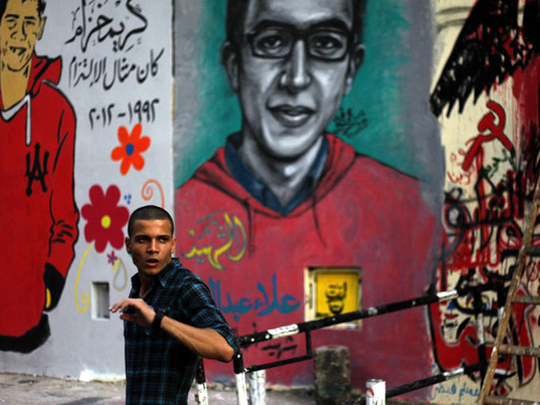
Historians will look back at the Arab revolutions of 2010 and 2011 as the first stirrings of a movement for change that will eventually transform political, economic and social rights around the globe. Today’s anti-western demonstrations take protest to a dangerous level. But the popular mood may be far less about hostility towards the US and Europe, or support for religious extremism, than about a loss of hope.
After visits to the Middle East and North Africa over the past year, I could see how the uprisings, born in growing optimism about the dawn of new opportunities, have morphed into angry protests fuelled by frustration and despair. Global figures from the International Labour Organisation show that almost 75 million people aged between 15 and 24 were registered with their national governments as unemployed in 2011. That number is expected to rise this year. In some countries, the majority of young people are out of work.
I found young people more connected than ever to what is happening around the world, yet hanging around on street corners with nothing to do — and increasingly questioning the justice of their fate. Discontent stems from the lack of jobs and opportunity. In South Sudan, the world’s newest state, only 400 of the more than 100,000 girls aged between 14 and 16 are in school. Around the world, Unesco figures show that 61 million children are not reaching even primary school. Despite the second Millennium Development Goal of universal primary education by 2015, Africa is sliding backward. If nothing changes, two million more African youths will be out of school by 2015. Contrary to conventional thinking, the world is not on an irreversible path towards universal education. Under current trends, 50 million children worldwide will be out of school in 2025 and in 50 years, education for all will still be a distant dream. For millions, equal opportunity will remain a hollow promise and its absence a growing source of unrest.
I have never thought that for the poor to be wealthy, the wealthy will have to be poor. I don’t subscribe to the politics of envy. If there is one idea that inspires our modern world, it is that all children should have the opportunity to rise as far as their talents can take them. Unfortunately, where you come from still matters much more than where you are going. Eighty per cent of global income inequalities can be explained by who your parents are and where you live. Yet, instead of tackling the disadvantages that come from birth and background, government and international aid amounts to just $400 (Dh1,471) for the primary and secondary schooling of the typical African, while we spend upward of $100,000 — 250 times more — on her western counterpart. This gulf between our ideals and children’s experiences is what makes the cause of educational opportunity the civil rights issue of our generation.
It is, of course, essential to deplore violence, to hold extremists accountable for inciting the young and to support moderate leaders who attempt to assuage the growing anger of the crowds. But if fundamental inequalities in opportunity are not addressed, unrest will grow — not because young people are anti-American, but because they have abandoned hope. Extending educational opportunity is a moral, economic and security imperative.
Fortunately, there are good grounds for believing that we can deliver better chances for young people. Everywhere I go, from slums in Kibera, Kenya, to the Dalit untouchable communities outside New Delhi, I have met parents who understood the power of education. Mothers who had just sought refuge in South Sudan have told me that their children need food, shelter and security, but that what they wanted most for them was education.
Last week, the United Nations launched the Education First initiative. It unites businesses, governments, nongovernmental organisations, teachers, parents and pupils in a 1,000-day campaign to get every child into quality education by the end of 2015. As the UN special envoy for global education, I know how bold we must be in battling prejudice, discrimination and exploitation. We have to tackle the culture that takes 10 million girls out of school to become child brides; outlaw the forced employment of 15 million youths under 12 who never enter classrooms; end the brutalisation of those conscripted into armed groups, used by criminal gangs or sold into prostitution; and give hope to the 25 million out-of-school children living in conflict areas. We don’t need scientific breakthroughs or technological transformations — only a revolution in political willpower to train an additional two million teachers and build four million more classrooms. No parent I know would consider the $13.50 that the international community gives an African child in annual education aid too generous. Tragically, even that meagre amount is falling. We must convince governments and the public that a few dollars more from rich countries’ citizens for the education of a child in a poor country is a worthwhile investment. With support of only a dollar a year from the world’s middle class of one billion people, we could start to honour the millennium promise made to every child that they would be in school. When we are starting to understand the damage caused by the absence of opportunity, can we afford to refuse the next generation their chance?
— Washington Post
Gordon Brown is the United Nations’ special envoy for global education. He was prime minister of the United Kingdom from 2007 to 2010, after 10 years as chancellor of the exchequer.










